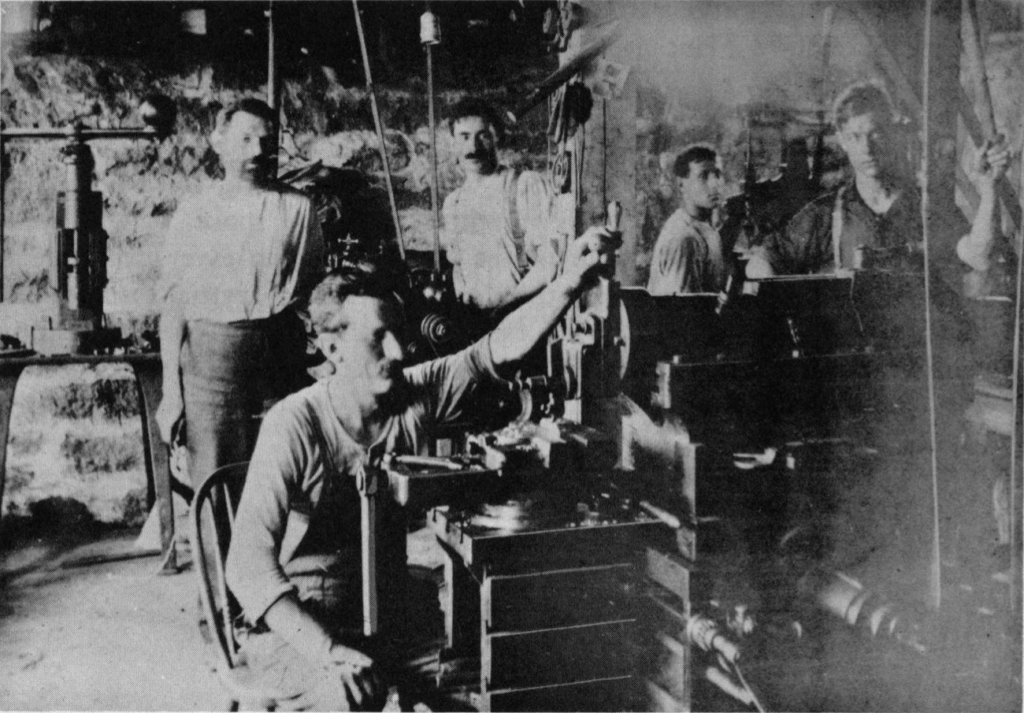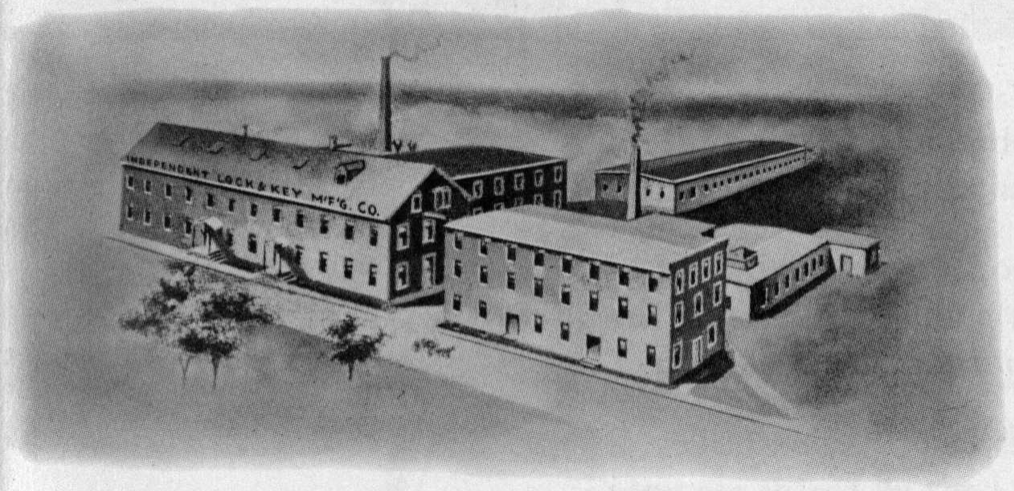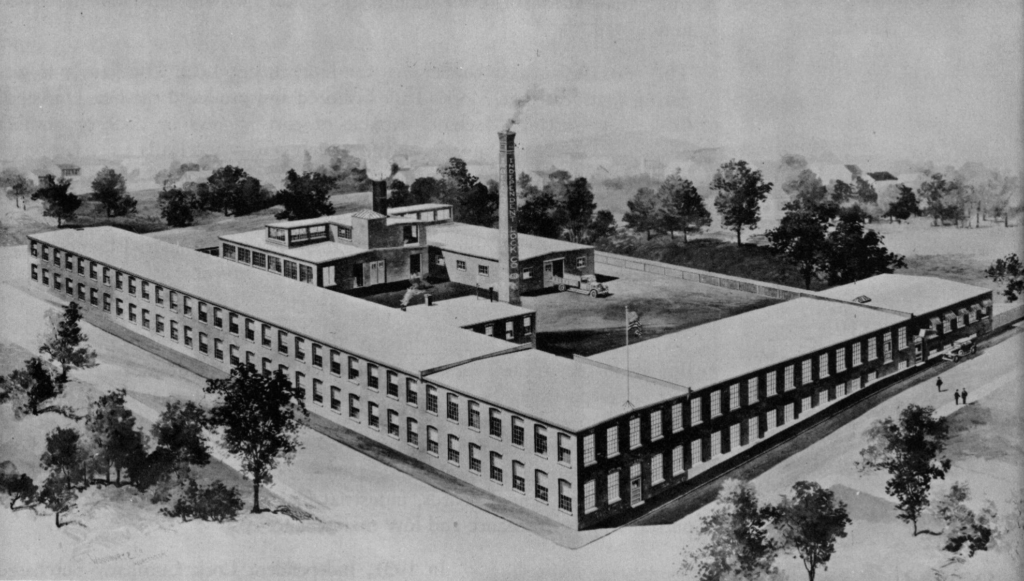Note: The following is a republished excerpt from the Lockwood Hardware Manufacturing Company’s Lockwood – The story of its past, the basis for its future. Published in 1953, and based almost entirely off of literature produced for Lockwood’s 1952 sales convention, it recounts the history of the Lockwood Hardware Manufacturing Company from 1834 until 1952.
By 1953, the Lockwood Hardware Manufacturing Company, then a division of the Independent Lock Company with both being headquartered in Fitchburg, Massachusetts, fielded branch offices in New York City, Philadelphia, Baltimore, Chicago, and Selma, Alabama along with five manufacturing plants in Fitchburg and one in Selma.
We have made no changes to this excerpt and what you see is exactly how it was printed in 1953, albeit in a different medium.

1917. Morris Falk and employees in first Independent Lock Company factory at Leominster, Mass. (Morris Falk, top center)
Chapter Four, The Independent Lock Co.
THE STORY of the Independent Lock Company is, fire and foremost, the story of a man, Morris Falk, to whom this booklet has been dedicated and whose personal story has been briefly described on page 3. Secondly, it is a story of other men he gathered around him who helped him in carrying out the policies he laid down; courtesy, consideration and fair play. Morris Falk’s word has always been better than a bond.
As previously mentioned, the Independent Lock Company was started because women bobbed their hair. In a small building Independent Lock Company began the manufacture of key blanks. That was its first product and it is an indisputable fact that today the Independent Lock Company makes more key blanks than any other company in the world.
It was not without serious competitive struggles, successfully overcome through quality production, that Independent Lock Company finally came into this leadership in the key blank field. When the infant business of making key blanks had grown to a staff of eight people, the original factory at Leominster, Mass., proved entirely inadequate and a larger building secured there. The company then began to expand its line, adding a few padlocks and night latches. The payroll, by 1925, had expanded to carry eighty employees, necessitating again a move to larger quarters.
Unable to find adequate space in Leominster and because of the co-operation of the Fitchburg Chamber of Commerce in security desired space, the Independent Lock Company, in 1926, moved to Winter Street in Fitchburg, Mass., into much larger quarters. At the time, these new quarters seemed more than adequate, even though expansion into the hardware field was anticipated.
The year 1927 was a banner one for Independent Lock Company. It was during that year that Morris Falk invented and produced the first Universal Code Key Cutting Machine, capable of cutting keys by code or number without a sample key, quickly and accurately. This was really a revolutionary development and production and sales grew accordingly.
In 1930 came the next major expansion of the company. In that year it bought the Worcester Blount Door Closer Company. Mr. Blount, whose name the Worcester Company used, was the inventor of the first liquid door closer ever made.
Looking back on the Blount closer of that period, it left much to be desired. But again the compelling urge of Morris Falk, in his desire to produce the best closer possible, led the company’s engineering efforts tirelessly until today the Ilco and Lockwood ball bearing full rack and pinion closer has established recognized leadership in the industry. That statement has been indisputably supported by the wide (and in many cases exclusive) acceptance by universities, school boards, industrial plants, and the like, because of its outstanding performance and low maintenance cost.
In 1931, the Independent Lock Company purchased the Lockwood Manufacturing Company. This was a year of tragic depression and panic. It was a momentous decision for Morris Falk and his staff that took great faith and courage. But confident of the future, for themselves, their company and the country, the decision was made and the transaction completed.
For the first year, operations were carried on in the old pant at South Norwalk, Conn., but the buildings and equipment, so highly praised by the “Hartford Daily Courant” and “Master Locksmith” had worn out and proved entirely inadequate for modern methods of manufacture. Therefore, it was decided to move the business to Fitchburg, Mass. The company was made a division of the Independent Lock Company and incorporated as the Lockwood Hardware Manufacturing Company.
Now, that factory on Winter Street in Fitchburg, which at the time of its purchase was thought adequate for all future expansion, proved to be hopelessly inadequate and again larger quarters were needed. Again through the help of the Fitchburg Chamber of Commerce, bankers and other interested Fitchburg citizens, the needed larger quarters were secured.
The building covered a large area and had about five acres of floor space, but with the moving of the Lockwood plant to Fitchburg, every square foot of space was needed. The building had been an old textile mill and therefore its equipment had to be entirely replaced. Those were indeed “touch and go” days – when the payroll often had to be raised by borrowing, digging into friends’ pockets or stalling creditors. Many were the times when it seemed impossible to carry on, but carry on they did and won out. Today the Corporation is rated AAA-1, the highest credit rating of Dun & Bradstreet.
In 1940, Independent Lock Company purchased Plant No. 2 on Nockege Street and in this plant, during World War II, made over 20,000,000 fuzes to help win the war. The company won six Army-Navy “E” awards. It was the first company in Northern Worcester County to win the coveted Army-Navy “E”, and the only company in the industry to win it six times. On that occasion, there were most impressive ceremonies and a nationwide radio broadcast conveyed the story all across the country.

Typical items in the early development of the Independent Lock Company’s long line of ILCO products.
During the years following the war, it became increasingly evident that the competitive situation created by modern plants, in the West particularly, and the need for central location in the country from a shipping standpoint made it necessary that Independent Lock Company expand again. In 1945 floor space was leased next to Plant No. 2 for further expansion is known as Plant No. 2-A.
In 1950, after months of study and visitation, a site was purchased in Selma, Alabama, where a million dollar plant has been erected and equipped, modern in every detail.
In 1951, because of serious overcrowding in the three Fitchburg Plants, a former Arena was purchased to add additional warehouse space.
In 1952, Independent Lock Company again increased its production facilities in Fitchburg by adding two large factories formerly housing the American Type Founders Company.
It should be explained that all the facilities of the Independent Lock Company are shared by the Lockwood Hardware Manufacturing Company.



